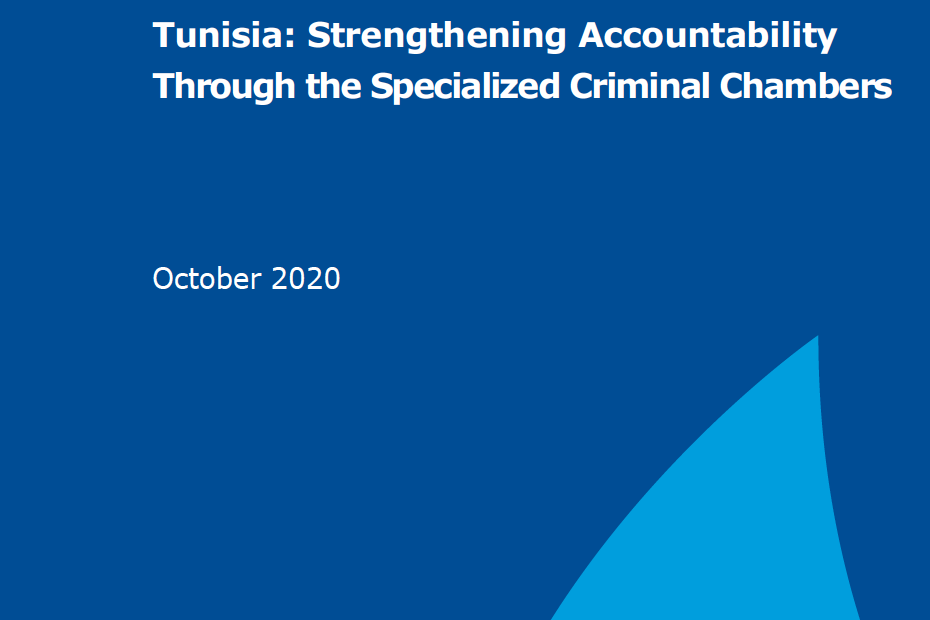In a briefing paper published today, the ICJ called on the Tunisian authorities to comply with their international law obligations and undertake substantial legal and policy reforms, strengthening accountability and delivering justice to victims of gross human rights violations.
Reforms are particularly needed to enhance the effectiveness of the Specialized Criminal Chambers (SCC).
They are also required to ensure that Tunisia fulfills its obligations under international law to criminalize, investigate and prosecute gross human rights violations, and to ultimately guarantee the rights of victims to an effective remedy and reparation.
Organic Law No. 53 of 2013 established the SCC to adjudicate past gross human rights violations; they have been operating since May 2018 but are currently facing a number of hurdles. Urgent amendments to the Criminal Code, the Code of Criminal Procedure and other relevant domestic law, as well as institutional, judicial and policy reforms are required to overcome these obstacles.
“The conduct of SCC trials in the absence of these reforms risks to seriously impede their effective operation in the short term, and to hamper Tunisia’s accountability efforts in the long term,” said Said Benarbia, the ICJ’s MENA Programme Director.
“The success of the transitional justice process and the fight against impunity rests largely on the political will of the Tunisian authorities to introduce these reforms, and to ensure that the SCC are able to carry out their work without hindrance.”
Tunisia’s domestic law fails to adequately criminalize crimes under international law over which the SCC have jurisdiction. Further, the application of a special procedure under the transitional justice framework for the investigation and prosecution of gross human rights violations has resulted in the Office of Public Prosecutor and other investigative authorities playing little to no role in the prosecution of SCC cases. In addition, this special regime gives rise to concerns about the collection, admission, exclusion and assessment of evidence during the trial stages.
All these obstacles have the potential to adversely impact the fair trial rights of the accused, the victims’ right to an effective remedy and reparation, as well as the participation and protection of victims and witnesses at trial.
Additionally, Tunisia’s domestic law does not sufficiently guarantee the rights of the accused, nor does it fully ensure the rights of the victims and their families or adequate protective measures for victims and witnesses.
The briefing paper addresses these issues and makes key recommendations on three areas of outstanding concern, namely:
- Adequate criminalization of crimes under international law and applicability of the principle of legality and non-retroactivity;
- Investigation and prosecution of gross human rights violations; and
- Collection, admissibility and assessment of evidence in the investigation, prosecution and adjudication of gross human rights violations.
In addition, in light of the recent annual judicial rotation, which has resulted in many of the SCC not having quorums and on trials been delayed, the ICJ calls on the High Judicial Council to ensure that the SCC judges have security of tenure, and that annual rotations do not undermine the SCC’s ability to conduct their work and dispense justice and ensure accountability for decades of gross human rights violations in Tunisia.
“The High Judicial Council should rapidly fill the posts that are currently vacant in the SCC and ensure that newly appointed judges receive timely and adequate training in transitional justice, as required by Organic Law No. 53 of 2013,” said Kate Vigneswaran, the ICJ’s MENA Programme Senior Legal Adviser.
“Moreover, safeguards should be put in place to ensure that changes in the composition of the bench mid-way through trials do not prejudice the fairness of the proceedings, and to ensure that those judges who continue hearing cases have the appropriate understanding of the evidence and arguments.”
Contact:
Said Benarbia, Director, ICJ Middle East and North Africa Programme, t: +41-22-979-3817; e: said.benarbia(a)icj.org
Kate Vigneswaran, Senior Legal Adviser, ICJ Middle East and North Africa Programme, t: +31-62-489-4664; e: kate.vigneswaran(a)icj.org
Tunisia-Strengthening Accountability SCC-Advocacy-Analysis brief-2020-ENG (full paper in English, pdf)
Tunisia-Strengthen Accountability-News-2020-ARA (full story in Arabic, pdf)
Tunisia-Strengthening Accountability SCC-Advocacy-Analysis brief-2020-ARA (full paper in Arabic, pdf)

